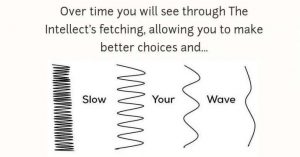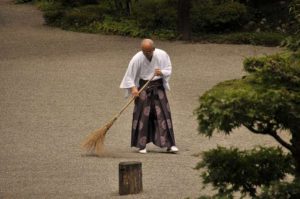A questioner in Thailand once asked the beloved Kammatthana Forest Tradition monk, Ajahn Suchart Abhijato a complicated question: what happens to the mind/consciousness when a good man dies with a clouded mind?
Below, I have paraphrased Ajahn Suchart’s response.
Since kamma means “action,” performing good actions and bad actions may be compared to recording business transactions as a profit or a loss.
As long as you are alive, you will perform both good and bad actions—and such doing of good and bad kamma can be compared to a business firm’s keeping a balance sheet, maintaining a record of fluctuations between expenses and income. At the end of the fiscal year, when you finally close your firm’s financial accounts, you’ll check the accounting balance sheet to see if you have generated more or less income compared with expenses.
When a person dies, their mind consciousness is carried over and then belongs to their positive or negative kamma—in much the same manner as an audit record shows the state of the firm’s annual business balance. If your expenses amount to more than your income, you’ll become bankrupt. But if income exceeds expenses, you’ll be making a successful profit.
Figuratively speaking, when you die, the kamma you have accumulated while alive automatically records the standing balance prior to the next period’s accounting record. When you have accumulated more bad kamma than good, the bad kamma will cause the mind-stream to move toward an undesirable state of consciousness, and dependence on deteriorating conditions can lead one to become a hungry-ghost, a ghastly specter, a hellish-spirit, or even an animal.
However, when your good accumulated kammic credit gain is more than your bad kamma account loss, your good kamma can cause you to become a deva, existing in one of the upwardly spiraling levels of heavenly angels—depending on the degree of good kamma you have performed up to the present and for which you have gained merit and earned credit. The more good acts you have performed, the higher the level of existence your next birth may be; the greater the accumulation of good kamma, the more blissful the attainment of cultivating a clear, clean state of being may be.
The residual problem next arises, however, that once your gain of previously accrued good kamma is gradually used up and eventually depleted, then you will have to return again to earthly existence, becoming a seed of energy within a mother’s womb, vibrating in a momentary, mundane, mind/body frequency, and then slowly growing as an embryo, to experience rebirth as human being—according to the level determined through developing bad or good kamma.
So, then, once the process of striving, achieving, gaining, and maintaining positive kammic balance begins again. You keep engaging with the same old anxieties, insecurities, and sufferings over and over again, being conditioned and dependent on an uneasy need for excessive sensual desires, salaciously savored and satisfied—constantly seeking to indulge and soothe the heart/mind through sensual satisfaction. This is dependent on indulging in the sense pleasures, seeing, hearing, smelling, touching, and tasting, greedily stimulating and overloading the body’s overworked and worn sense organs.
On the one hand, there is the danger that your desires to indulge yourself by stimulating your various sense organs may also obviously be accompanied by choosing to keep committing certain selfish, unwholesome, harmful, destructive, and possibly even perverse kammic actions that would have better been avoided.
On the other hand, there is the possibility that had you been fortunate enough to be born in a loving family, with sufficient security, income, and assets, then you may have been less frequently tempted to feed an insecure need to begin committing unwholesome, harmful, excessive kammic actions, causing you to become dependent upon craving and obsessively indulging in stimulating such compulsive, insatiable desires.
The good news here is that because you have enough income to meet everyday needs, you will also have a better possibility of creating good kamma through kindly, compassionately, generously, and sympathetically sharing with others helping others. When such good things happen, you will be constantly accumulating merit and good kamma.
From this moment onward, you will be creating good or bad kamma and at the end of your lifespan, the balance of your good or bad kamma will be weighed to determine which way the mind-stream will flow in your next rebirth, at which time you will probably still need to strive to gain better control of your intentions and actions, to attain and maintain the best possible kammic counterpoise.
While the kammic cycle of existence may appear to be running on incessantly—either pushing and pounding you or elevating and exhilarating you—it may happen that you reach a point of frustration such that you become so disenchanted with the vain pursuit of satisfying sensual pleasures. You then come to realize and understand the core truth of the Dhamma, which teaches the noble way of stopping the selfish, insatiable self from continually regenerating the debilitating process of attachment to rebirth.
As a refreshing antidote, through awakening, intuition, and vision, you will see how the noble path leading to the surcease of suffering—in actual practice, works—and you finally understand how to halt the impulsive drive of obsessive addiction. You finally become fully free of the worldly compulsion of always sensuously desiring and seeking to satisfy low-vibrational sensual cravings.
Up to this point, the unwholesome side of desire, dependent on craving, which had formerly seemed to be a vicious cycle of inescapable attachment and addiction, had been the dominating force of life. It continually caused your rebirth within lower realms of existence again and again. The solution to the burden of suffering is that when you can finally fight to become free of such base craving, there will be no more delusive forces causing you to participate in the suffering cycle of rebirth.
Ultimately, once such desires and cravings have been systematically eliminated, before the body finally dies, the positive vibrations will continue working until the cleared, cleaned, creative mind-stream causes the selfless, empty, liberated life energy to become one with unborn, uncreated nibbana. Finally free of the cycle of rebirth, a higher frequency of vibrating, kammic energy finally becomes one in harmony with the wider, pulsating frequency of the cosmos.
In nibbana, there is peace beyond understanding. The causes of restlessness, agitation, and worldly irritation are completely eradicated from mind-consciousness, finally bringing about true happiness.
See more
Ajahn Suchart Abhijato
Dhamma in English (YouTube)
Ajaan Suchart Abhijāto: Dhamma for the Asking (Facebook)
Related features from BDG
On the Seven Factors of Enlightenment, Part One
On the Seven Factors of Enlightenment, Part Two: Mindfulness and Keen Awareness
On the Seven Factors of Enlightenment, Part Three: Arousing Energy and Attaining Rapture
On the Seven Factors of Enlightenment, Part Four: Tranquility, Concentration, and Equanimity














